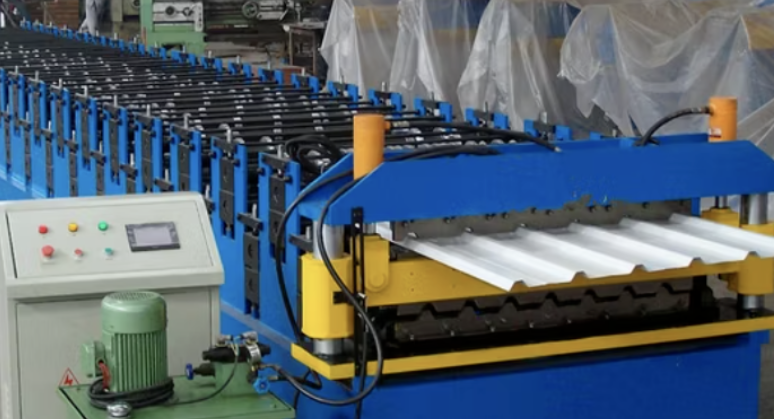The roll forming industry is thriving in Israel, serving sectors from construction and real estate to agriculture and infrastructure. Choosing the right profile is key to the success of any project, and understanding the most common profiles used in Israel can help buyers and machine operators make informed choices.
1. Introduction to Roll Forming Profiles in Israel
In Israel, roll forming profiles are essential to construction, infrastructure, and agriculture, where durable, reliable components are required. Roll forming machines shape metal coils into standardized or customized profiles, which are then used in building structures, roofing, storage facilities, and greenhouses, among other applications. Selecting the right profile—and the right machine to create it—is critical for companies aiming to meet industry standards while keeping production efficient and cost-effective.
2. Most Common Roll Forming Profiles in Israel
Each profile type serves distinct purposes, making it vital to choose profiles that match project requirements. Let’s examine the most widely used profiles in Israel and the industries they cater to.
Roofing Profiles
- Common Types: Corrugated, trapezoidal, and standing seam profiles.
- Applications: Roofing profiles are integral to residential, commercial, and industrial projects, providing reliable coverage and protection against weather elements.
- Materials: Commonly made from steel and aluminum, selected for their durability and resistance to Israel's diverse climate, including coastal humidity and desert heat.
- Industries Served: Construction and infrastructure projects rely heavily on these profiles for roofing and wall cladding applications.
Panel Profiles
- Common Types: Wall panels, ceiling panels, and insulated sandwich panels.
- Applications: Often used in warehouses, office buildings, commercial construction, and internal partitions, these profiles provide sturdy, insulated, and visually appealing structures.
- Industries Served: Construction, manufacturing, and agriculture. Panel profiles are particularly popular in agricultural storage and industrial facilities that require controlled environments.
Frame Profiles
- Common Types: U-channels, Z-sections, and C-channels.
- Applications: Frame profiles are commonly used for structural framing in buildings, greenhouses, and temporary structures, offering versatile load-bearing capabilities.
- Industries Served: Construction, agriculture (particularly greenhouse and crop storage structures), and industrial shelving. Frame profiles are a staple in sectors requiring durable and adaptable structures.
Window & Door Profiles
- Common Types: Door frames, window profiles, and jamb profiles.
- Applications: These profiles are central to the construction of windows and doors in residential, commercial, and industrial buildings.
- Industries Served: Real estate and urban development, where new housing projects and building renovations are on the rise, especially in growing urban centers.
3. Industries Served by These Profiles in Israel
In Israel, roll forming profiles support key sectors, each with unique requirements:
- Construction and Real Estate Development: The demand for roofing, panels, and framing profiles is high across urban and rural development projects. Both residential and commercial construction projects prioritize roofing and cladding profiles that can withstand Israel's varied climate conditions.
- Agriculture: Given Israel's innovation in agricultural technology, roll forming profiles are essential in building greenhouses, livestock facilities, and crop storage structures. Frame profiles like U-channels and Z-sections provide the needed strength and adaptability.
- Infrastructure and Transport: Profiles are commonly used for bus shelters, transportation hubs, storage units, and signage structures. Robust and corrosion-resistant profiles are essential to meet the structural and safety requirements in these projects.
4. Tips for Selecting the Right Machine for Israeli Market Profiles
With a better understanding of popular profiles, here are some tips for selecting the ideal roll forming machine for the Israeli market:
Profile-Specific Machine Design
- Ensure the machine can produce the specific profile type required for your project, whether roofing, panel, or frame profiles. Machines with customizable rollers and dies enhance efficiency by allowing for fast, precise adjustments for different profiles.
Material Compatibility
- Machines should be designed to handle steel, aluminum, and other metals that suit Israel’s climate. For instance, steel provides durability against heat, while aluminum is corrosion-resistant for coastal areas. Choosing rollers and cutting systems compatible with these metals will optimize production.
Power Supply Compatibility
- Verify that the machine aligns with Israel's power standards (voltage and frequency). Machines incompatible with local power requirements may cause operational delays and additional setup costs. Choosing a machine designed to match Israel’s electrical standards reduces downtime and maximizes productivity.
Production Speed and Efficiency
- Machines with adjustable speed settings are ideal for Israel’s varied project scales, ranging from small construction jobs to large industrial operations. High-speed machines can fulfill large-volume demands efficiently, while slower speeds may be better suited for custom or precision work.
Additional Features for Productivity
- Machines equipped with advanced features like remote PLC systems, automated stackers, and robust safety enclosures provide added convenience and reduce labor costs. These features can also help ensure long-term efficiency, making production smoother and reducing operator workload.
5. Conclusion
Selecting the right roll forming profile and machine for Israel’s market involves understanding both the profile types and the unique needs of the industries they serve. Whether it’s roofing profiles for residential buildings, panel profiles for agricultural facilities, or frame profiles for industrial shelving, aligning machine capabilities with project requirements is key.
Investing in high-quality, profile-specific machines can deliver significant productivity and cost savings in the long run, making it a wise choice for manufacturers and suppliers in Israel. For businesses navigating Israel’s expanding markets, it’s beneficial to work with experts who can provide guidance on machine specifications tailored to their specific profiles and applications.




